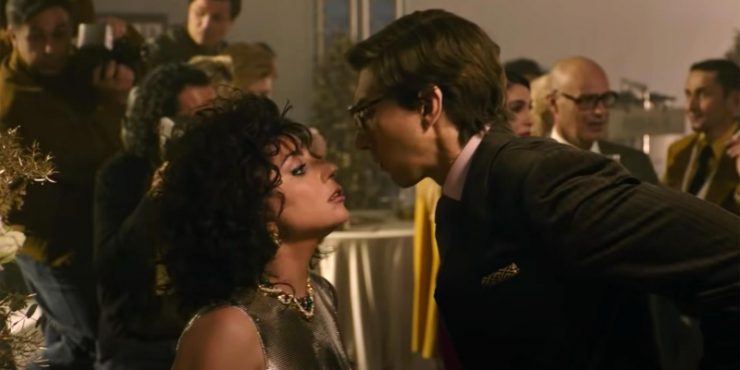How many ham actors can one movie sustain? Ridley Scott sees that question, scoffs, and then proceeds to make House of Gucci, a film based on the Sara Gay Forden book that documents the tragic way in which the Gucci family lost their Gucci brand. The story is rich with seduction, manipulation, betrayal, murder. Those unfamiliar with the headline-stealing scandal may be shocked to see the degree to which the family played a part in their own destruction, but House of Gucci tips its hand early on. This is a very cinematic story, ripe for the epic treatment, and filled with over-the-top characters that actors just love to play. Who chews the scenery more than Al Pacino? Jeremy Irons? Jared Leto underneath a mountain of make-up and fake hair? It’ll come as a surprise to no one that they’re all out-vamped by Lady Gaga.
The film is led by the comparably muted Adam Driver, who proves to be Gucci‘s most measured, un-flamboyant performance. As Maurizio Gucci, he is awkward and shy. His aspirations are to be a lawyer in Milan and stay out of the famed Gucci business run by his father, Rodolfo (Irons), and uncle, Aldo (a terrific Pacino). His plans change when he begins seeing Patrizia Reggiani (Lady Gaga). She works in her father’s trucking company, but has grander ambitions. When she hears Maurizio’s last name, her eyes light up. His proximity to luxury is everything she’s ever wanted, and she quickly pounces, while convincing him to take a more active interest in the family business.
Rodolfo will not accept their relationship, calling out Patrizia as an obvious gold digger, but it’s Aldo who has the legitimate power, running the company in New York City. Aldo blesses them and their eventual marriage, which sets the stage for Maurizio’s placement near the top of Gucci. The top is where Patrizia always wanted to be, guiding her husband slowly up the ranks, convincing him that it’s what he wanted as well. There are some complications. Namely, Maurizio’s own spiritual corruption when graced with such economic power. There is also Aldo’s son, Paolo (Leto), a notorious incompetent whose own dreams for fashion design are stalled by his lack of talent (Browns and pastels? Together?). Success proves to be a hidden curse for both Maurizio and Patrizia, and neither is left unscathed on the journey back to the bottom.
This is the second 2021 film for Ridley Scott after The Last Duel, a film that is quite different on the surface but fascinating in its similarities. Both involve women ensnared within the revolving drama of a group of vain men, and in both films they are driven to desperate measures in order to survive. Duel had the benefit of Nicole Holofcener as both a writer and producer. Gucci is the more glamorous film, more entertaining scene-by-scene, but it does lose steam in its last hour where the story becomes less dependent on the charisma of its characters and more on true crime plot points. Where Last Duel had the great benefit of a strong final act, by the last hour of Gucci, the film is helpless against nonfiction.
That doesn’t stop the actors from committing to Gucci‘s larger-than-life premise. It’s Succession-level family dysfunction, with power plays leading to awkward birthday dinners; where trust between fathers, cousins, and uncles cannot be held. Pacino is in his full glory as Aldo, finding the perfect stage for his preferred fire-and-brimstone verbosity. The eighty-one year old actor has been maligned often as a caricature, but Gucci is proof that the proper context can show him to still be among the best actors alive. Leto, unrecognizable and in full regalia, has the film’s more precious comedic bits. No one can deny Leto’s devotion to acting, even if the details of his methods are unseemly, and his performances are occasionally slack. That can’t be stated here, as he wins his scenes as the pathetic Paolo.
But let’s be clear, this is Lady Gaga’s film. Her maniacal puppet master routine is the engine that makes Gucci go for its first two acts. With a thick accent and a threatening aura, Patrizia claws after power and prestige like cinema’s greatest femme fatales, caring not for the collateral damage and waiting little for her piece of the pie. It comes to the film’s detriment that Gucci sidelines her for large chunks of the last hour, and giving her precious little to do when she does appear. That is, with the exception of Gucci‘s explosive finale which I won’t spoil in case you’re not brushed up on the Gucci history. Much like A Star is Born, Gaga is doing acting and myth-building at the same time, adding another element to her sizable legend.
I wanted to enjoy House of Gucci much more than I ultimately did. Its cast is up for the challenge but it does struggle to sustain its energy over 158 minutes. Ridley Scott is nothing if not serviceable as a director, and he gives the film the right mood throughout (and editor Claire Simpson is working wonders), but the script (by Becky Johnston and Roberto Bentivegna) gets too bogged down, too interested in business politics at the expense of the family drama. The film is quite entertaining, with a marvelous soundtrack and slick costumes. A crime epic in the standard of Scorsese, if not quite at that quality.
Directed by Ridley Scott










